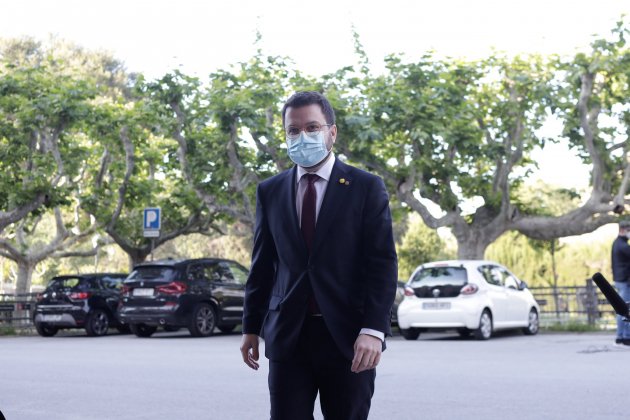The last time that the Catalan parliament gave the green light to a government budget was on March 22nd, 2017. It was prepared by the then-vice president and economy minister Oriol Junqueras, with his focus on what was to become the 1st October referendum. Today, both he and the vast majority of members of Carles Puigdemont's government have had to follow events from prison or exile as, after three years of extensions and patch-ups, the government has again passed a budget thanks to the support of the left-wing Catalunya en Comú. A budget that is 3.1 billion euros bigger than the last one, yet is born out of date, as a result of the coronavirus crisis.
In an unprecedented parliamentary session this Friday, with only 21 of the 135 deputies present, the final vote was 65 votes in favour - all the MPs of the two pro-independence governing parties, JxCat and ERC, 8 abstentions - the left-wing Commons block - and 61 against: the Catalan Socialists (PSC); the right-wing pro-Spain parties Ciudadanos and the PP; and the left-wing pro-independence CUP. Those who attended the session in person did so wearing masks and gloves and maintaining the minimum separation of two metres from one another. For the first time in history, some Catalan deputies voted by remote means. But only 25 did so, all from JxCat, which has been pushing to apply this system since the beginning of the legislature, thinking of the investiture of the exiled Puigdemont. The other parliamentarians who weren't there delegated their votes.
The global pandemic has completely upset the spending forecasts detailed in the 2020 accounts. Since the Catalan economics ministry introduced the bill on January 20th, the change has been dramatic. The Covid-19 crisis will force the budget numbers to be recalculated immediately after they have been validated. This was acknowledged by vice-president Pere Aragonès. In health alone, it is estimated that the extra expenditure will be 1.8 billion euros.

Catalan vice-president and economy minister Pere Aragonès
"First stone in the reconstruction"
Although many adjustments will have to be made, the Catalan vice president celebrated the passing of the new accounts and affirmed that the action lays the "first stone in the reconstruction" and in the "economic and social rescue plan" to combat the coronavirus. The ERC politician describes the 2020 budgets as a “better toolbox” for fighting the pandemic than the much-extended 2017 accounts and he argued that continuing to “work with patch-ups” is impossible.
Aragonés also spoke of a "new era" and pointed out the need to make a "paradigm shift" that puts the "economy of life" at the centre. "If there is one thing that Covid-19 has shown, it is that the only thing that cannot be recovered is life," said the vice president, who took the opportunity to call for "a fairer, freer and more prosperous country", adding that those who paid for the 2008 crisis must not pay for the coronavirus crisis as well.
However, he also wanted to extend his hand to the opposition, especially the CUP and the PSC, who voted against the budget. Aragonés asked them to take part in a "national reconstruction agreement". Appealing specifically to the Socialists, he reminded them that they have an important role to play in this new era as the "main party of the Spanish government", and he asked them to collaborate to find resources. He also demanded that the dialogue on the Catalan conflict be resumed and that reconstruction should not be "detrimental" to putting an end to the "unjust imprisonment" of the pro-independence leaders.
From the CUP to the Commons
Three years ago, the Puigdemont-Junqueras government's ally to pass its budget was the CUP, but this time the executive has changed partners. The numbers were negotiated with the Commons, given the refusal of the pro-independence leftists of CUP to guarantee the stability of the JxCat-ERC government, and the package includes a reform of inheritance tax and personal income tax.
The alliance with the Ada Colau bloc has been a two-way street: the Commons voted for the Catalan government's budget, and JxCat and ERC returned the favour with the budget for Colau's Barcelona city council. Despite her group's support today, Commons spokesperson Jèssica Albiach was extremely critical of the Torra government, denouncing that "part of the independence bloc has made it their hobby to insult us". And she questioned whether “part of the government” was even interested in the Commons' help pass the budgets.
However, Albiach justified the vote in favour as it is "the only way to protect public services." The "progressive tax reform" included in the budget represents an income increase of 3.1 billion euros compared to the last accounts in 2017, and therefore she says the better option is to get this budget bill through the house, instead of waiting another half year to process a new one.
Outstretched hand of the opposition
The rest of the opposition parties offered cooperation for the future, but turned their backs on the budget, finding it pointless. They had already planned to vote against it before the coronavirus crisis, but today their main argument was that the accounts are "useless" given the size of the crisis that has emerged unexpectedly.
The PSC highlighted that the part of the 2020 budget allocated to health has already been spent. The Catalan Socialists called the spending provisions "deceptive." Ciudadanos used the same reasoning, although in different words. They called the accounts "a journey into the past" because they were designed before the pandemic. In the same vein, the CUP stated that the numbers are born "out of date and subject to change." Likewise for the PP, the budget is "not valid".
However, both Ciudadanos and the Socialists called on the government to "put aside differences" and offered "an outstretched hand" to deal with the crisis that Covid-19 has caused "regardless of the outcome of the vote today". The PSC proposed a "disruptive reconstruction pact" that not only includes political parties but also economic and social agents in Catalonia.
The election announcement, a distant horizon
Beyond the economic content, the passing of the Catalan budget had an even more significant focus after president Quim Torra announced that he would call an election in Catalonia following the umpteenth crisis between the two government partners, JxCat and ERC. The date of the vote was to be announced immediately after the budget was passed.
But that is all gone with the coronavirus wind. Torra himself said last week that it is not the time to dissolve the government and call an election. The electoral scenario, then, has retreated somewhat. However, Spain's Supreme Court could again alter the plans, once it issues its final ruling on Torra's disqualification from holding office.

